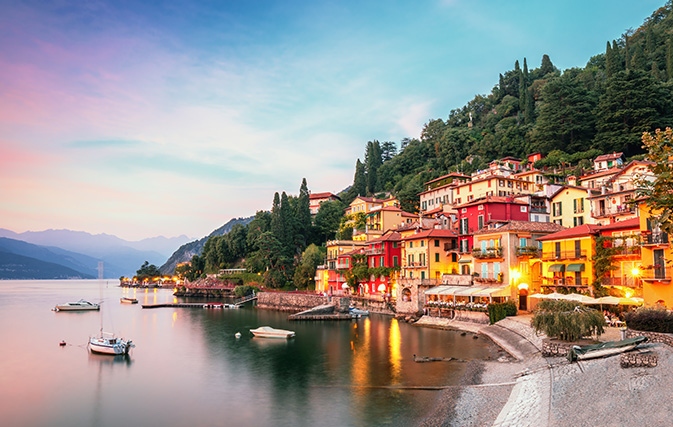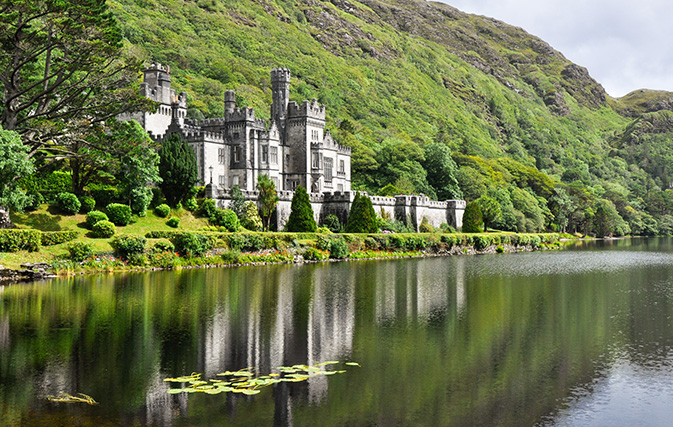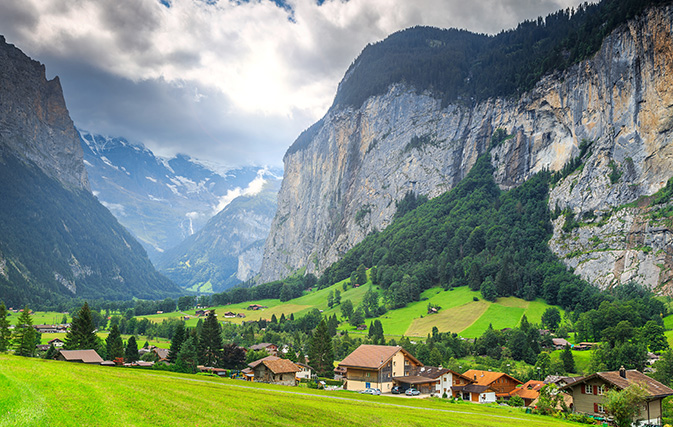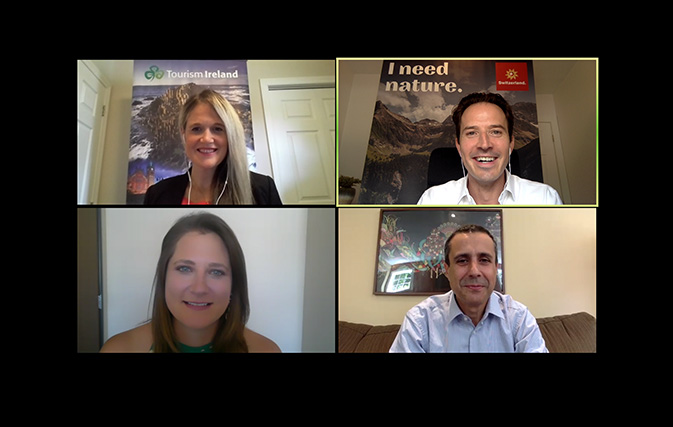TORONTO — Europe’s borders have largely reopened to Canada but with individual destinations implementing their own safety measures and entry requirements, travellers are having a tough time sifting through the varying protocols.
To provide a better understanding of what these differences are, Travelweek hosted a Facebook Live event yesterday, July 30, featuring three of Europe’s top destinations: Ireland, Switzerland and Italy. Speaking during the hour-long informative session were Dana Welch, Manager-Canada of Tourism Ireland and Chair of the Canada chapter of the European Travel Commission (ETC), Pascal Prinz, Director-Canada of Switzerland Tourism and Vice-Chair of ETC’s Canada chapter, and Salvatore Basile, Coordinator of the Italian National Tourist Board (ENIT), all of whom discussed how their respective destinations have handled the ongoing pandemic, and the changes travellers can expect on the ground in this new normal.
The European Union, which first opened for travel within its own borders in May and June, began a partial and gradual lifting of its travel restrictions to international tourists on July 1. Canada was among 14 countries to have been given the green light to travel to Europe, even though Canada’s borders remain largely closed to foreign visitors as part of its blanket-wide approach to mitigating the spread of COVID-19.
Despite Canada’s hard-nosed policies, Welch is hopeful that reciprocity will happen soon.
“It’s a very dynamic situation but we’re hopeful that Canada will open up using a scientific approach that looks at certain countries with similar infection rates,” she said. “The relations between Canada and Europe are so strong. I know the Canadian Tourism Roundtable and the airlines have been quite active in trying to engage the government, there’s a lot of work happening in that regard.”
In the meantime, Canadians – even with Canada’s non-essential travel advisory still in place – are free to travel to many parts of Europe. Transat is offering flights to Paris, London and Toulouse as part it its reduced summer schedule, WestJet will service London-Gatwick and Paris from Calgary starting Aug. 20, and Air Canada’s abridged summer schedule includes Toronto to Frankfurt, London and Zurich, Montreal to Frankfurt, London, Paris and Brussels, and Vancouver to London. Plus, a handful of insurance companies are now including coverage for COVID-19, giving Canadians added peace of mind.
Here’s an overview of what was discussed during yesterday’s event:
ENTRY REQUIREMENTS
Ireland, which never technically closed its borders, has implemented a cautious five-phase plan (now compressed to four) to reopen its tourism sector, relying heavily on its Tourism Recovery Task Force and Aviation Task Force for guidance. Canadians are currently permitted to visit Ireland, however they will need to self-isolate for 14 days upon arrival and fill out a Public health Passenger Locator form. These measures, says Welch, are under constant review.
Switzerland, which first reopened borders to all EU states and Great Britain on June 15, reopened to additional countries listed as ‘safe’, including Canada, on July 20. There is currently no mandatory quarantine in place for Canadians “so you can arrive and immediately explore our beautiful country,” said Prinz. “It really is open again – you can go paragliding, hiking, swimming, biking, there is lots of space for physical distancing in our mountains and hundreds of valleys. The situation is very similar to here in Canada so you’ll need to wear masks on public transport and when you go shopping, for example. Otherwise, things are open.”

Lake Como, Italy
Italy is now allowing Canadians to visit without a specific reason; up until a few days ago, travellers required a business or medical reason to enter the country. However, visitors are required to self-isolate for 14 days at a fixed address, after which “they are free to move around as any Italian tourist would through regions,” said Basile, who added that 99% of everything that was open before the pandemic has reopened to tourists. Masks are required in confined spaces, restaurants have reduced capacity depending on square footage, and physical distancing in public is being enforced, all of which are “logical” measures that “Canadians won’t have a program adjusting to.”
THE NUMBERS IN ITALY TODAY
Italy was the first European nation to be affected by COVID-19, with its first case reported on Jan. 31. Since then, the country has paid “a huge human cost,” recording over 35,000 deaths nationwide and over 247,000 confirmed cases since January. On July 30, it saw a total of 382 cases.
When asked what the situation is like today, Basile said the situation has greatly improved (despite an uptick in cases in the past two days), and that Italy is now considered a leader in mitigating the spread of the virus.
“Today, we actually saw five regions with zero cases, and there are eight regions in Italy with less than 10 cases. Deaths are getting lower and lower, so are cases, and there are regions that haven’t seen any new cases in many days,” he said. “Now there are strict measures in place and we are confident that they can stand the test of time. With the exception of the last few days, we had very good numbers, among the best in the world.”
Of course, numbers can change at any moment, given how rapidly the pandemic is evolving. And now with neighbouring Spain seeing a second wave (it reported a second day of 1,000+ cases on July 30 since lifting its lockdown in June), Italy is on high alert.
“We’re all in the same boat, what’s happening to Spain could very well happen to Italy next week, next month,” said Basile. “The plan right now in Italy is to have strict measures in every district where every region is responsible. The contingency plan is to have everything limited to when it happens. This is a dramatic situation and every country is doing their best to limit the spread of the virus.”
WHAT IF I GET STUCK OR SICK IN DESTINATION?
According to Prinz, one of the top trends he’s seeing nowadays is travelling to visit friends and family. This, he said, would be to a traveller’s benefit should they suddenly find themselves stranded in Switzerland in the event of a second wave and resulting border closures. “If you have to extend your stay, organize yourself in a way so that you can extend with friends and family.”
When asked whether a Canadian can simply walk into a Swiss hospital and receive medical care in destination should they contract the virus, Prinz said yes: “Switzerland’s medical system is resiliently strong.”
In both situations, Prinz suggested booking with a travel agent who he said offers great value for money as well as peace of mind.
“You want to make sure you get the right insurance, and there are certain Canadian insurance companies that are partly covering covid,” he said. “Do you really want to spend hours and weeks online reading about forms? You will not get the right answer and what you will certainly not get is peace of mind. This is really where travel agents can save us and get us out of this crisis.”
THE IMPORTANCE OF TOURISM
In Ireland, tourism accounts for an excess of 4% of the country’s GNP and employs 325,000 people across the island. “There’s no contesting how important tourism is,” said Welch. “The European Commission states that international travel is key for tourism and businesses, but also for reconnecting family and friends. I think the time has come to look at some concrete preparations to lift these travel restrictions.”

Kylemore Abbey, Ireland
Welch also noted how several destinations have started offering tax breaks, subsidies and discounts to locals and travellers in an effort to kickstart economies and boost tourism industries. Prague, for example, is offering vouchers to attractions to local tourists and travellers from nearby countries, while in Italy residents are being offered tax breaks and spending money for tourism-related services. In Piemonte and Sicily, travellers are also being lured by free hotel nights.
“I think governments have been looking at many ways to stimulate tourism and get folks to travel within their country and attract tourists coming in,” said Welch.
Basile, who said it’s impossible to imagine a world without tourism, is encouraging agents to reach out to ENIT directly to learn more about various travel incentives. With tourism accounting for 13% of Italy’s GDP, incentivizing travellers is a top priority.
“Tourism is a huge chunk of the economy, it has to come back,” he said. “We have to understand the best way to cope with this emergency and try to put in place the safest measures possible. What we’re doing today goes to that direction, and I don’t know what else we could do better at this particular stage.”
Prinz, who said that travel is one of the largest industries worldwide, accounting for 10% of all jobs, projected it would take two to three years for tourism in Europe to rebound. Though this may sound grim, he said the wait would be worth it “because there’s no alternative, we love what we do, we’re passionate about our planet and we’re curious.”
He added: “The World Health Organization has said that travel bans are not a long-term solution. We really have to look at the costs of keeping borders closed. We’re one planet and so we have to start thinking of how to do this in a responsible and safe way.”
WHAT TO SELL
Ireland’s lush green landscapes await Canadians when the time is right, said Welch. At that time, agents are encouraged to sell ‘Embrace the Giant Spirit,’ a new suite of 23 signature experiences launched last year for Canadians. One notable experience is ‘Whisky on the Rocks,’ exclusive to book by travel agents and combining the Giants Causeway (the rocks) with Bushmills Irish Whisky (the whisky). Upcoming webinars about ‘Embrace the Giant Spirit’ are currently in the works.
In Switzerland, Prinz is recommending the ‘Grand Tour of Switzerland’, a self-drive road trip that spans 1,600 kilometres and highlights 12 UNESCO World Heritage Sites, 22 lakes and five alpine passes. “It’s fantastic,” he said, “over 10 days you will see lots of lovely small villages and happy cows, hear people speak four languages and cook good food.”

Bernese Oberland, Switzerland
Prinz also reminded agents that Switzerland is known for being a clean and safe destination: “Maybe clean is the new sexy!”
Speaking optimistically, Basile, who noted that September is the peak season for Canadians to visit Italy, highlighted a new Raphael exhibition in Rome featuring 100 masterpieces and running through August until mid-September. But for those who prefer to stay away from crowds, he recommended visits to smaller cities in Lombardy and Piemonte, like Cremona, known for traditional violin making. The southern part of Italy, said Basile, is also a good option since it has been less affected by the pandemic.
“Some areas that weren’t targeted by international travellers before are now seeing a bit of a revival of services for tourists,” he said. “So the mountain areas and small villages are actually seeing some good numbers.”
A FINAL WORD TO TRAVEL AGENTS
All three speakers were in agreement: travel agents are essential to each of their destination’s recovery.
“Agents have proven time and time again how critical they are and now is unlike any other in terms of their importance,” said Welch. “I know we’ve had record numbers on our webinars, I’ve been so impressed with their enthusiasm. We couldn’t do what we do without them and so we want to make sure we’re supporting agents in the best possible way.” Welch recommended that agents join Tourism Ireland’s dedicated agent Facebook page for the latest updates and refer to the EU’s new ‘Re-open EU’ interactive site, which provides real-time information on reopenings and restrictions across all EU Member States.
Basile encouraged agents to stay updated and educated about the destination “because when the time comes, they’ll want to be ready to bounce back with travellers.” ENIT will soon launch an agent specialist program with Travelweek’s Learning Centre, the details of which will made available on http://www.travelweeklearningcentre.com/.
Prinz also touted the importance of education for agents, referencing the Switzerland Travel Academy, which since its launch in April 2017 has seen close to 3,000 graduates.
“It’s like always in life: if you read a book, do training or learn something, it will pay off in the long run, I’m 200% convinced of that,” he said. “Your studying of Ireland, Italy, Spain, Germany, Switzerland and Portugal will pay off later this year because people will want to travel and use their travel credits.”
Prinz also noted that Switzerland Tourism is focused on giving travel agents much-needed leads at this time. As such, the organization is currently working on its next campaign for late summer/early fall.
“We want to give you that push, we want people to book with you,” he said. “We cannot be idle and just wait until there’s a vaccine. We have to continue to work together, to talk to each other. This is a very important industry – we all depend on it and I have the utmost respect for all advisors out there who are really braving the storm.”

